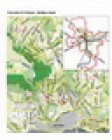T-Mobile tests new A-GPS solution from Siemens in the Czech Republic

The Siemens Communications Group has developed a new solution for the Assisted Global Positioning System (A-GPS) which will allow mobile operators to integrate the new navigation technology into their mobile networks far quicker than before. T-Mobile Czech Republic a.s. is currently testing the Siemens solution in Prague. The terminal used is the SX1 phone from Siemens which was fitted with an A-GPS chip specially for the field trials. Siemens' IP-based A-GPS solution will be on the market from the 3rd quarter of 2005.
Current standardized A-GPS solutions require costly intervention in the mobile network, as the infrastructure has to be adapted to the 3GPP Location Services standard. The IP (Internet Protocol)-based A-GPS solution from Siemens, on the other hand, comprises a special location server that can be integrated directly into the mobile network and communicates with the mobile terminal via an IP connection. "The network-independent IP-based A-GPS solution from Siemens has the clear advantage that we are able to offer our customers the new navigation service with a reasonable investment. We are convinced A-GPS will give strong impetus to the market for location-based services both in the end-consumer and the corporate customer segment", said Heinz Schmid, Executive Vice President Technology T-Mobile Czech Republic.
"We can expect the market for A-GPS-based navigation services to be given a boost about the middle of 2005. That is when the Open Mobile Alliance (OMA) will have specified the standards for IP-based A-GPS solutions. These standards are essential if the terminal devices of different vendors are to be able to exchange data with all mobile networks", explained Christoph Caselitz, President of Mobile Networks at Siemens Communications.
A-GPS
To pinpoint the location of a user, the Global Positioning System (GPS) generally used up to now depends on line-of-sight contact with the satellites that orbit the earth at an altitude of 20000 kilometers. A navigation device must be able to receive the signals of at least three of them in order to determine its position. In this process a conventional GPS receiver could well take several minutes to receive the satellite navigation data and calculate its position from them. In the shadow of high-rise blocks in large cities or inside buildings the satellite signals are often so weak that GPS doesn't function reliably. With A-GPS the mobile phone receives data from the mobile communications network on the orbits, frequencies, and operating ability of the satellites and can analyze weaker satellite signals in seconds. The A-GPS technology uses the radio link between base station and mobile phone to transmit the collected satellite data in a few seconds. This saves considerable energy and time in comparison with GPS. After the device is switched on it only takes a few seconds instead of minutes till the user knows where he is, even in open country.
T-Mobile Czech Republic a.s.
T-Mobile Czech Republic a.s. was established in 1996 (then called RadioMobil) and in the same year, it began offering mobile communications services under the name Paegas. In 2002, the Company changed its brand and subsequently its name. T-Mobile operates a public mobile communications network on the GSM standard in the 900 and 1800 MHz bands and is a holder of a licence to operate a third-generation network, UMTS. As of 19 April 2004, more than 4 million customers were using its services. In June 2004, the Company welcomed its millionth contract customer, thus becoming the largest Czech mobile operator as measured by the number of contract customers. T-Mobile Czech Republic a.s. is a member of the global telecommunications group T-Mobile International.
For more information visit: http://t-mobile.cz
Siemens Communications is one of the largest players in the global telecommunications industry. Siemens is the only provider in the market that offers its customers a full-range portfolio, from devices for end users to complex network infrastructures for enterprises and carriers as well as related services. Siemens Communications is the world's innovation leader in convergent technologies, products and services for wireless, fixed and enterprise networks. It is the largest Group within Siemens and operates in more than 160 countries around the world. In fiscal 2004 (year-end September 30), its 60,000-strong workforce posted sales of approximately 18 billion euros.
More about Siemens Communications at http://www.siemens.com/communications
T-Mobile Czech Republic, a member of the international telecommunications group Deutsche Telekom, has almost 6.2 million customers, the number-one operator in the Czech market. T-Mobile is an integrated operator: in addition to telecommunications services, it offers comprehensive ICT solutions not only for companies, but also for other organizations and individuals. It provides outstanding services in the high-speed network, which was proved repeatedly by benchmark testing performed by umlaut (former P3) with Best-in-Test seal.
T-Mobile Czech Republic places emphasis on taking a responsible approach to the environment and society. It adheres to fair business practices, helps beneficial applications and services to see the light of day, supports non-profit organizations, small businesses and individuals, and lends a helping hand whenever crisis situations arise. The company’s employees serve as volunteers in many places across the entire Czech Republic.
More information about the company is available at www.t-mobile.cz, www.t-press.cz (the portal for journalists) and www.t-mobile.cz/pomahame (information on the company’s CSR activities).
Contact details of the press unit: press@t-press.cz.

 Twitter
Twitter Facebook
Facebook